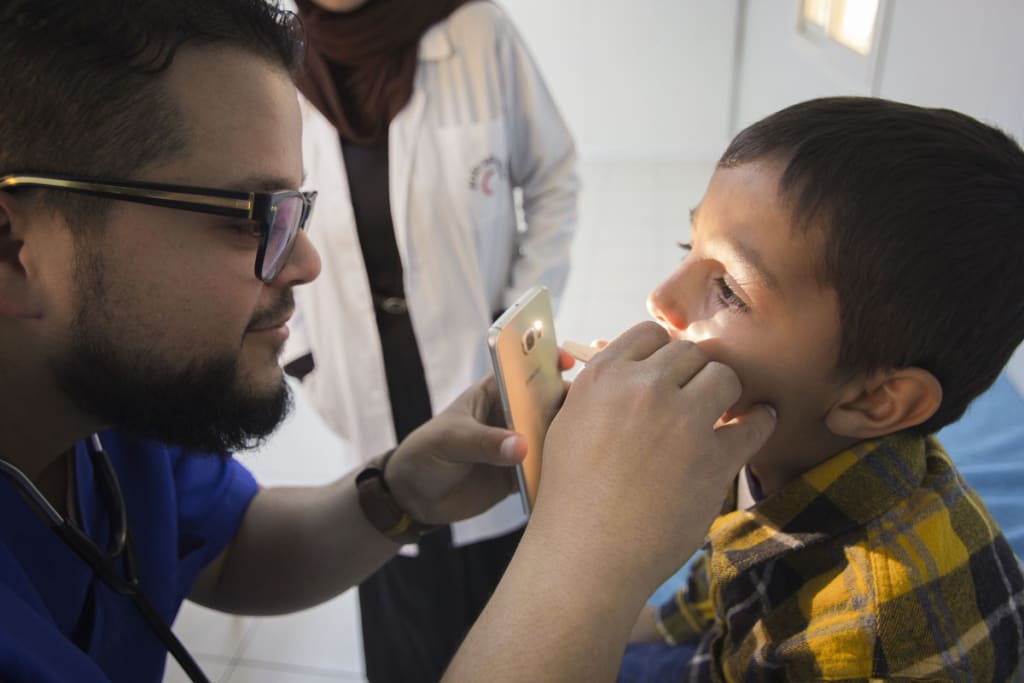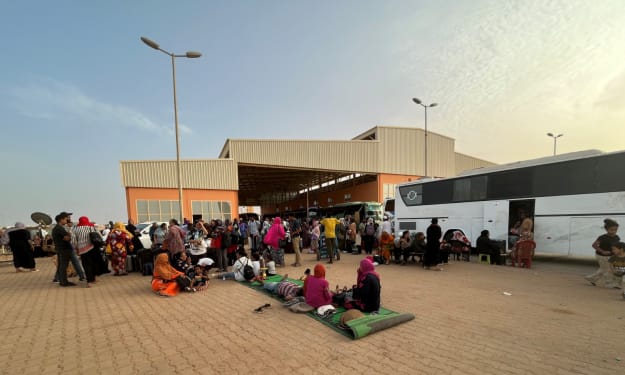In Libya, cities welcome return of former residents displaced by war
As residents gradually return to their homes, the local council faces the urgent task of providing essential services and promoting stability in Tawerga.

Global data show an exponential increase in the number of people who have been forced to leave their homes but remain in their countries. According to the latest figures from the Internal Displacement Monitoring Center (IDMC), the number of internally displaced persons will increase to 71.1 million by 2022.
Beyond these numbers are human beings who are suffering enormous pain and loss. Displaced people can face discrimination and exclusion, be cut off from their communities, and be deprived of livelihoods and vital services for years or even generations. Displacement has a profound impact not only on those who are displaced, but also on the communities that remain behind and those in which displaced people seek safety and services.
More than 60 percent of UNDP programming is in fragile settings, including large-scale displacement of populations. It builds on our support for the 2030 Agenda for Sustainable Development and the UN Secretary-General's Agenda for Action on Internal Displacement.
The conflict that erupted in Libya in 2011 forced about a million people from their homes, mostly to cities such as the capital Tripoli. Displaced, they struggle to find work, meet basic needs, get a good education for their children, stay healthy and feel safe.
When hostilities began to cease, UNDP and partners worked with national and local governments to create the conditions for voluntary return and rebuild trust with citizens who had endured years of civil war and displacement.
Bring Tawergha back to life
In 2018, Misrata and Tawerga signed a UN-mediated peace treaty ending the conflict between the two cities and allowing Tawerga's IDPs to consider returning, ending seven years of conflict and displacement.
“When the roads reopened, I left my job in Tripoli, packed my equipment and returned to my city,” said Faisal Essa. In 2011, he fled Tawerga, along with 95% of Tawerga's residents, due to heavy fighting.
Faisal and others who have returned have found their homes and infrastructure severely damaged and their economies vulnerable, making recovery even more difficult.
Jumaa also chose to return. "Our excitement quickly turned into realizing that life wasn't easy. Almost everything was destroyed," he said. In addition to the devastation, returnees have found there to be no jobs, no electricity, water, gas, transport, medical and educational facilities.
The local council faces the urgent task of providing essential services to returning former residents. UNDP helps them re-establish services, create jobs and restart the process of building a sense of community.
Schools, hospitals and jobs that matter to families
One of the UNDP-supported efforts was the installation of 40 solar-powered lampposts to make residents feel safer. One of the lampposts is located outside the Jumaa store. "I used to have to close after sunset, but now I can stay open late," he said.
With UNDP support, the local government has assisted small businesses, created more than 200 jobs in Tawergha and rehabilitated three schools with more than 500 students. So far, more than half of the previous 40,000 people have returned home. "Tawergha is slowly coming back to life," said Faisal Essa.
The rehabilitation of Libyan schools is crucial to encouraging people to return home. Eleven-year-old Faraj and his family were displaced from the city of Sirte. "I couldn't believe my eyes. The school was completely destroyed and turned into a pile of rubble," he said.
The municipality of Sirte, with the support of UNDP, carried out a complete renovation of the school building both internally and externally. Now, 500 students and 82 staff are benefiting from the transformed learning environment.
"The school looks very beautiful. I am excited to continue my education and pursue my dream of becoming a doctor," Faraj said. "I also love playing football and I am very happy to be able to play with my friends on the new pitch."
The Children's Medical Clinic in Sirte was severely damaged during the fighting. “We had no choice but to go to Ben Jawad, which is 150 kilometers away,” said Awad Khalifa, a parent of two. The clinic is now back to normal and fully equipped to serve the community again.
Doctor examines children
Families returning to Kikla do not have access to medical care. They had to travel more than 50 kilometers to receive treatment.
Photo: UNDP Libya
From Conflict to Recovery
UNDP's work to support displaced persons and returnees was initially part of the Libya Stabilization Fund (SFL) 2016-2022, which assists national and local administrations in 24 cities. More than 500,000 returnees have benefited from improved infrastructure and services, the capacity of municipalities has been supported and local mediation has been strengthened.
“Our work in restoring communities and empowering IDPs is not just about rebuilding infrastructure, it’s about rebuilding lives. By building resilience, delivering essential services, and contributing to local peacebuilding, we contribute to a brighter, more inclusive The foundations are being laid for the future of the country," said Marc-André Franche, UNDP Resident Representative in Libya.
SFL is supported by Canada, Denmark, the European Union, France, Germany, Italy, Japan, South Korea, the Netherlands, Norway, Switzerland, the United Kingdom and the United States. UNDP continues to provide assistance to people affected by displacement as part of the EU-funded Strengthening Local Resilience and Resilience (SLCRR) project.
A sample survey found that 79 percent of residents were satisfied with civil works, and 60 percent of civil society organizations and local peace actors surveyed said local authority performance had improved significantly.
Restoring trust, legitimacy and inclusion requires addressing the root causes of internal displacement and empowering those caught in crisis. As in Libya, UNDP is supporting governments and local authorities to ensure equal access to rights and basic services, promote socioeconomic integration, restore security and build social cohesion to bring about real change and sustainable solutions to internal displacement .





Comments
There are no comments for this story
Be the first to respond and start the conversation.